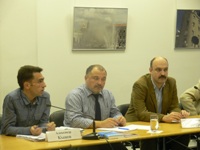Registration
You will receive an email confirming your registration.
IMGXYZ2771IMGZYXRegional political life in Russia is changing. While the number of deputies and professionalization (number of full-time deputies on a salary) of regional parliaments is falling, the number of appointed politicians is rising. Rather than working to win the support of local populations, these politicians focus their efforts on proving their loyalty to a small group that decides regional government appointments. These trends were among the issues discussed at the Carnegie Moscow Center’s launch of the new book, Irregular Triangle: State-Business-Society Relations in Russia’s Regions, edited by Nikolay Petrov and Alexei Titkov.
The discussion was chaired by Carnegie’s Nikolay Petrov. He was joined by co-editor Alexei Titkov of the Higher School of Economics, Leonid Smirnyagin of Moscow State University, and Alexander Kynev of the Foundation for Information Policy Development.
A Comprehensive Study
The book was written based on materials gathered during the first stage of the Carnegie Moscow Center’s comprehensive study of relations among society, state, and business throughout Russia. The book examines the social, political, and economic mood and situation in four regions—Irkutsk, Murmansk, Orenburg, and Astrakhan regions—during the two years before the 2008 financial crisis.
Smirnyagin praised the book for a number of qualities:
- It presents a huge volume of factual material obtained through fieldwork.
- Many of the articles were written by regional political analysts who have access to material beyond the reach of specialists based in Moscow.
- It presents detailed and accurate portraits of the regions.
- It sets out numerous clear conclusions.
While the four regions examined in the articles offered a diverse picture, the book could have given a more representative outlook by studying regions without oil and gas resources as well, he added. Smirnyagin also suggested that the study might have benefited from a more detailed discussion of trilateral communications among state, business, and society, rather than just looking at the paired relations of state and business, state and society, and society and business.
Changing Role of Regional Parliaments
The participants noted that significant changes have occurred in regional political life since the study was carried out. Parliaments in the regions presented in the book have traditionally been quite strong, but the legislative branch is now weakening in Kynev’s view.
- Fewer deputies: The end of the decade has brought a trend toward fewer deputies in regional parliaments, Kynev pointed out.
- De-professionalization of parliaments: Each of the four elections over the last two years has seen a decrease in the number of deputies working on a professional basis. As a result, deputies, for whom politics is not their primary employment, have no time to work with documents personally and are forced to rely on the documents prepared for them by administration staff.
- Increasing rotation of speakers and the instability of their position: The March 2010 elections resulted in the replacement of five speakers in eight regions. In most cases the job was taken either by the deputy governor or by the newly appointed secretary of United Russia’s regional political council.
Changes to the Regional Executive Branch
Executive power in the regions has also undergone a change since the studies for this book were carried out.
- Replacement of regional administrations: Increasingly, the administrative staff of regional leaders is being replaced with regional government cabinets, explained Kynev. A new post has been created, that of the head of the regional government. This post is separate from the governor. These new government cabinets do not rely on the regional parliaments for power and do not give the parliaments any additional influence.
- A new breed of governors: As Titkov noted, before the abolition of gubernatorial elections, popular support was important for governors. As a result, where they once tried to please the voters, governors now pay attention to those who appointed them. Local residents receive a minimal package of benefits to keep them from protesting, but no more than that.
Relations Between the Regional Authorities and Federal Representatives in the Regions
There has been a recent trend toward less contact between the heads of the regional offices of federal agencies and the local political elite, Petrov noted. In the past, only the head of the regional Federal Security Service had no relation to the region. Now, the heads of the regional Interior Ministry and the Prosecutor’s office, as well as chief federal inspectors, are also being appointed to their posts from outside the region. As a result, these offices are less aware of the problems facing the region and less inclined to communicate with local officials and residents on how best to address the regions’ needs.
Main Trends in Municipal Government
- Abolition of mayoral elections: More and more municipalities are abolishing direct mayoral elections; already more than 25 big cities have done so. The abolition of direct mayoral elections is intended to strengthen the United Russia Party’s vertical hierarchy. But in reality, Kynev said, in the country on the whole this does not happen, because there are some 25,000 municipalities and the most important factor in most municipalities is not the United Russia as a brand but various local interest groups familiar to the local people.
- Distribution of votes: United Russia traditionally receives fewer votes in large cities than in small towns.
- The opposition’s effectiveness: Kynev noted that the opposition is more effective at the municipal level than at regional level, because individual reputations matter more than party affiliations at the local level. Whether at the municipal or regional level, however, Kynev acknowledged that political activists make up only a small fraction of society.
